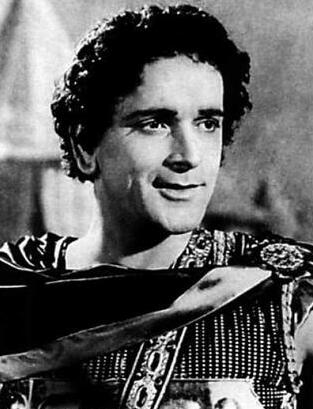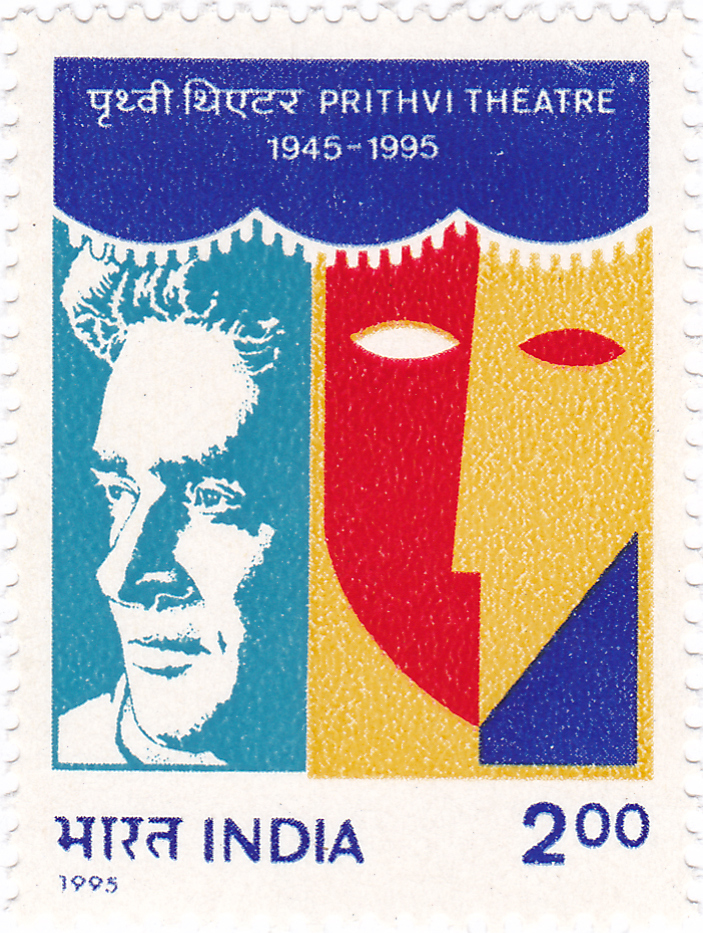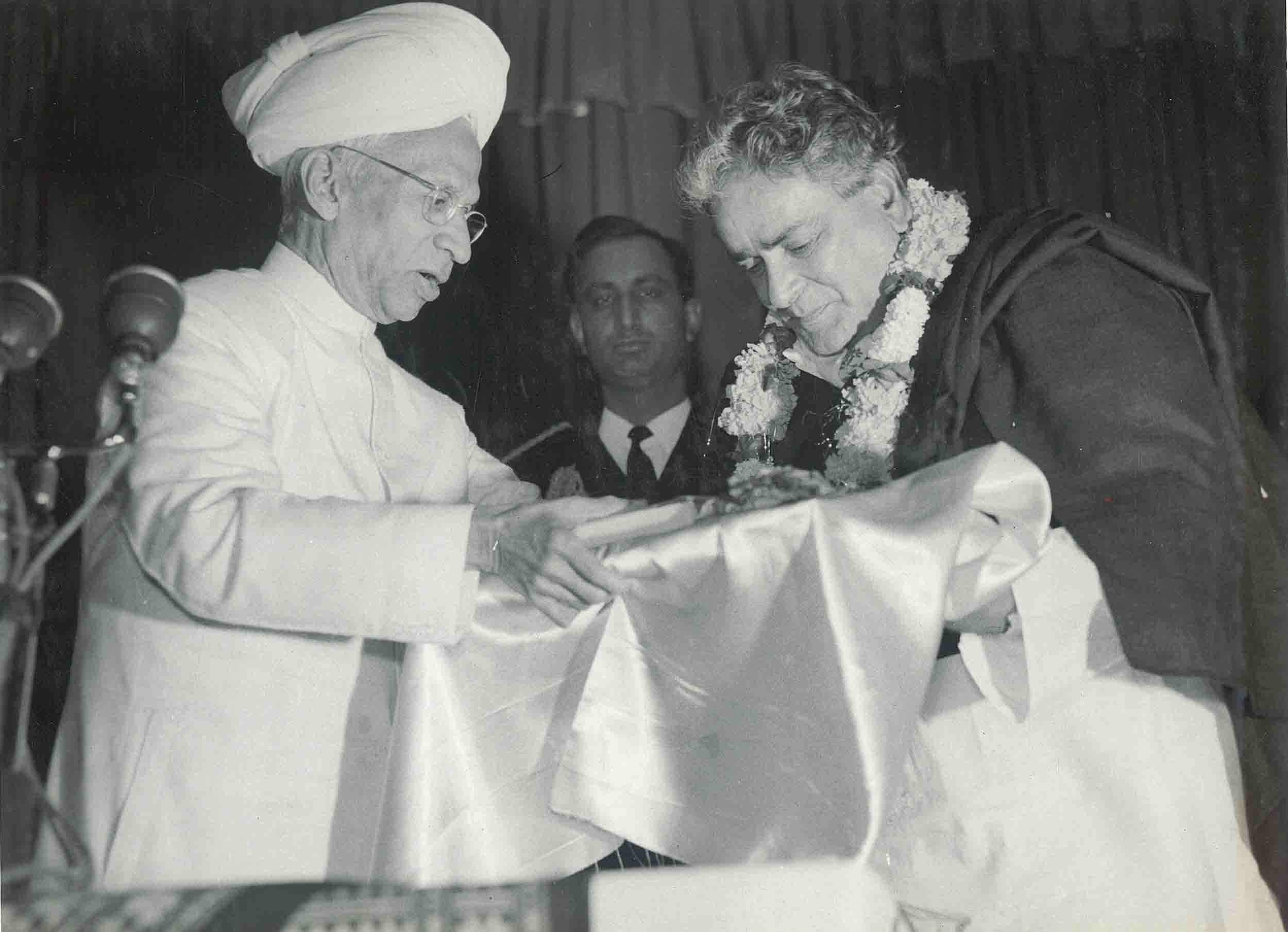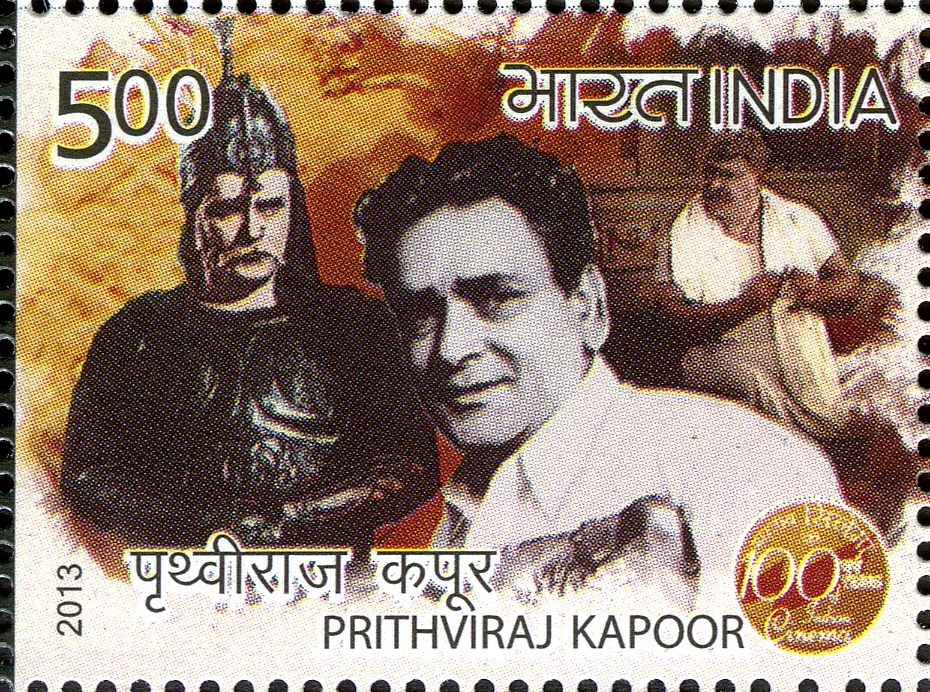1. Early Life and Education
Prithviraj Kapoor's early life and educational journey laid the foundation for his distinguished career in the performing arts.
1.1. Birth and Family Background
Prithviraj Kapoor was born as Prithvinath Kapoor on 3 November 1906, in Samundri, Punjab, British Raj (now Punjab, Pakistan). He belonged to a Punjabi Hindu Khatri family of the Kapoor gotra. His father, Dewan Basheshwarnath Kapoor, served as a police officer in the Indian Imperial Police. His grandfather, Dewan Keshavmal Kapoor, and his great-grandfather, Dewan Murli Mal Kapoor, were Tehsildars in Samundri, near Lyallpur (now Faisalabad).
Kapoor was the eldest of eight siblings, which included five boys and three girls. Among his brothers was Trilok Kapoor, who also became an actor. Film producer Surinder Kapoor, the father of actors and producers Anil, Boney, and Sanjay Kapoor, was a cousin of Prithviraj Kapoor. Interestingly, his father, Basheshwarnath Kapoor, also made a brief appearance in his son Raj Kapoor's film, Awara.
1.2. Education
Kapoor spent much of his childhood in Lyallpur District, where his grandparents and extended family resided. Later, his father's transfer led the family to Peshawar, North West Frontier Province, although they maintained their house and property in Lyallpur. Prithviraj Kapoor initially pursued his studies at Lyallpur Khalsa College in Lyallpur. He then continued his education at Edwardes College in Peshawar, where he earned his Bachelor of Arts degree. Following his graduation, he briefly studied law for a year before ultimately deciding to pursue a career in acting.
2. Career
Prithviraj Kapoor's extensive career spanned both the vibrant world of Indian theatre and the burgeoning Hindi cinema industry, where he left an indelible mark as an actor and a visionary.
2.1. Early Theatre and Move to Bombay
Kapoor began his acting journey on the theatrical stages of Lyallpur and Peshawar. In 1928, driven by his ambition to pursue a career in film, he relocated to Bombay (now Mumbai) with financial assistance from an aunt. Upon arriving in Bombay, he joined the Imperial Films Company, where he began taking on minor roles in films.
2.2. Film Debut and Early Career
In 1929, Prithviraj Kapoor made his official acting debut as an extra in the film Be Dhari Talwar. The following year, in 1930, he secured his first lead role in his third film, Cinema Girl. He went on to appear in a total of nine silent films, including Be Dhari Talwar, Cinema Girl, Sher-e-Arab, and Prince Vijaykumar.
A significant milestone in his early film career was his supporting role in Alam Ara (1931), which holds the distinction of being India's first talkie. His performance in Vidyapati (1937) was particularly well-received. During this period, he also joined the Grant Anderson Theater Company, an English theatrical troupe that remained in Bombay for a year. Throughout these early years, Kapoor maintained his deep commitment to theatre, performing regularly on stage. He quickly earned a reputation as a highly skilled and versatile actor, excelling in both stage and screen performances. His most celebrated performance from this era is arguably his portrayal of Alexander the Great in Sohrab Modi's Sikandar (1941).
2.3. Founding and Operation of Prithvi Theatres

By 1944, Prithviraj Kapoor had achieved sufficient standing and financial stability to establish his own theatre group, Prithvi Theatres. The company's premiere performance, Kalidasa's Abhijñānaśākuntalam, had actually taken place in 1942, preceding the formal founding of the theatre company. The success of his eldest son, Raj Kapoor, in film productions by 1946 also provided an enabling factor for Prithviraj's investment in Prithvi Theatres.
Prithvi Theatres staged numerous memorable productions across India, becoming a highly influential force. Its plays were instrumental in inspiring young people to actively participate in the Indian independence movement and the Quit India Movement. Over its 16 years of existence, the theatre company presented approximately 2,662 performances, with Prithviraj Kapoor himself starring as the lead actor in every single show. One of his most popular plays was Pathan (1947), which was performed nearly 600 times in Mumbai. Opening on 13 April 1947, Pathan told the story of a Muslim and his Hindu friend, promoting themes of unity and understanding.
By the late 1950s, the landscape of entertainment had shifted, with cinema irreversibly supplanting the travelling theatre. It became financially unfeasible for a troupe of up to 80 people, along with their props and equipment, to travel the country for four to six months at a time, living in hotels and campsites. The financial returns from ticket sales and the diminishing generosity of patrons from India's former princely class were no longer sufficient to sustain such an endeavor. Many of the talented actors and technicians nurtured by Prithvi Theatres, including all of Prithviraj's own sons, found their way into the thriving film industry. As Kapoor entered his 50s, he gradually curtailed his theatre activities, accepting occasional film offers, including those from his sons. He notably appeared with his son Raj in the 1951 film Awara, portraying a stern judge who had cast his own wife out of his home.
Eventually, under the leadership of his son Shashi Kapoor and daughter-in-law Jennifer Kendal, Prithvi Theatre merged with the Indian Shakespeare theatre company, "Shakespeareana." This merger led to the establishment of a permanent home for the company, with the inauguration of the Prithvi Theatre in Mumbai on 5 November 1978.

2.4. Later Film Career
In his later years, Prithviraj Kapoor continued to deliver powerful performances in several notable films. His filmography from this period includes Mughal-e-Azam (1960), where he gave what is considered his most memorable performance as the Mughal emperor Akbar. This role earned him a nomination for the Filmfare Award for Best Supporting Actor. He also played the lead role in Harishchandra Taramati (1963), delivered an unforgettable portrayal of Porus in Sikandar-e-Azam (1965), and appeared as the stentorian grandfather in Kal Aaj Aur Kal (1971), sharing the screen with his son Raj Kapoor and grandson Randhir Kapoor.
Kapoor also starred in several significant Punjabi films. These include the legendary religious film Nanak Nam Jahaz Hai (1969), which was so highly revered in Punjab that it drew lines many kilometers long for tickets. He also appeared in Nanak Dukhiya Sub Sansar (1970) and Mele Mittran De (1972). Additionally, he acted in the Kannada film Sakshatkara (1971), directed by the acclaimed Kannada director Puttanna Kanagal, in which he played the father of Dr. Rajkumar's character.
3. Major Works and Achievements
Prithviraj Kapoor's career was defined by a series of impactful theatrical productions and iconic cinematic roles that cemented his legacy in Indian arts and culture.
3.1. Notable Theatre Productions
Prithvi Theatres, under Kapoor's leadership, staged several significant plays that left a lasting impression. Among these, Kalidasa's Abhijñānaśākuntalam was the company's premiere performance in 1942. Another highly notable production was Pathan (1947), which achieved immense popularity, being performed nearly 600 times in Mumbai. This play, which opened on 13 April 1947, explored the friendship between a Muslim and a Hindu, using its narrative to foster social consciousness. The theatrical works of Prithvi Theatres were not merely entertainment; they served as powerful tools for social change, inspiring young people to engage with the Indian independence movement and the Quit India Movement.
3.2. Notable Film Roles
Prithviraj Kapoor's cinematic career is marked by several iconic performances that showcased his versatility and commanding screen presence. His portrayal of Alexander the Great in Sohrab Modi's Sikandar (1941) is considered one of his definitive early roles. Later, his performance as the Mughal emperor Akbar in Mughal-e-Azam (1960) became one of his most celebrated and memorable, earning him critical acclaim and a Filmfare Award nomination. He also delivered a powerful performance as Porus in Sikandar-e-Azam (1965). In Awara (1951), he played the stern Justice Raghunath, a role that highlighted his dramatic range. His final significant role was as the stentorian grandfather in Kal Aaj Aur Kal (1971), where he shared the screen with his son and grandson, symbolically connecting generations of the Kapoor family in cinema.
4. Ideology and Social Engagement
Prithviraj Kapoor was deeply committed to social causes, utilizing his artistic platforms, particularly theatre, as powerful mediums to convey meaningful messages and foster societal change.
4.1. Indian People's Theatre Association (IPTA)
Prithviraj Kapoor was a founding member of the Indian People's Theatre Association (IPTA). IPTA was a significant cultural movement that emerged in the 1940s, dedicated to using theatre as a means of social commentary and progressive thought. Through his involvement with IPTA, Kapoor contributed to a form of theatre that addressed contemporary social and political issues, aiming to raise awareness and inspire action among the masses.
4.2. Theatre as a Medium for Social Change
Kapoor firmly believed in the power of theatre to instigate social change. His Prithvi Theatres actively staged productions that aimed to foster social consciousness and support national movements, most notably India's struggle for independence. Plays like Pathan (1947), with its themes of Hindu-Muslim friendship, exemplified his commitment to promoting unity and addressing societal divisions. Through his theatrical work, he sought to inspire young people to participate in the Indian independence movement and the Quit India Movement, demonstrating his conviction that art could be a potent force for national awakening and social progress.
5. Personal Life
Beyond his celebrated professional career, Prithviraj Kapoor's personal life was marked by significant family milestones, joys, and profound losses.
5.1. Marriage and Children
At the age of 17, Prithviraj Kapoor entered into an arranged marriage with 15-year-old Ramsarni Mehra in 1923. Their union, arranged by their parents, was harmonious and conventional, lasting throughout their lives. The actual wedding ceremony had taken place earlier, with the gauna ceremony (a farewell ritual) being celebrated when Ramsarni reached the age of 15, signifying her readiness to reside with her husband and in-laws. Ramsarni's brother, Jugal Kishore Mehra, later also ventured into the film industry.
The couple's eldest child, Raj Kapoor, was born the following year, on 14 December 1924, in Peshawar, North West Frontier Province, making Prithviraj a father at the young age of 18. By the time Prithviraj moved to Bombay in 1927, he and Ramsarni were parents to three children. In 1930, Ramsarni joined Prithviraj in Bombay. The following year, during her fourth pregnancy, the family experienced a tragic period when two of their sons died within the span of a single week. One child, Devinder (affectionately called Devi), succumbed to double-pneumonia, while another, Ravinder (known as Binder or Bindie), died from accidental poisoning after swallowing rat-poison pills that had been strewn in the garden.
Despite these heart-wrenching losses, the couple went on to have three more children: sons Shamsher Raj (Shammi) and Balbir Raj (Shashi), both of whom would become famous actors and filmmakers in their own right, and a daughter, Urmila Sial.
5.2. Later Years and Death
After his retirement from active performing, Prithviraj Kapoor settled in a cottage known as Prithvi Jhonpra, located near Juhu Beach in West Bombay. This property was initially on lease, but it was later purchased by his son, Shashi Kapoor, who subsequently transformed it into the small, experimental venue that is now the Prithvi Theatre.
Tragically, both Prithviraj Kapoor and his wife, Ramsarni, battled cancer and passed away just 16 days apart. Prithviraj died on 29 May 1972, followed by Ramsarni's death on 14 June 1972.
A samadhi (memorial) dedicated to Raj Kapoor at their family farm, "Rajbaugh," which translates to "the garden of kings," also houses the memorials of Prithviraj Kapoor and his wife. Rajbaugh is situated on the banks of the Mula-Mutha River in Loni Kalbhor village, approximately 19 mile (30 km) east of Pune in Maharashtra. A portion of the 125-acre Rajbaugh property was sold by the Kapoor family to MIT World Peace University (MIT WPU), which has since built and maintains a memorial for the Kapoor family on its campus. This memorial features seven pagodas and a viewing gallery displaying photographs of the Kapoor family. Raj Kapoor filmed many of his movies at this farm, including Satyam Shivam Sundaram, Mera Naam Joker, Bobby, and Prem Rog, among others. The Kapoor family's bungalow within the farm has been preserved, and the popular song "Hum Tum Ek Kamre Mein Band Ho" was notably shot inside this bungalow. Prithviraj Kapoor also shared a close friendship with the Hindi literature stalwart Harivansh Rai Bachchan.
6. Awards and Honours
Prithviraj Kapoor received numerous significant accolades and recognitions throughout his distinguished career, acknowledging his profound contributions to Indian theatre and cinema.
6.1. Major Awards and Recognitions

In 1954, Prithviraj Kapoor was honored with the Sangeet Natak Akademi Fellowship, one of India's highest honors for performing artists. Two years later, in 1956, he received the Sangeet Natak Akademi Award from the Sangeet Natak Akademi. His immense contributions to Indian arts were further recognized by the Government of India, which awarded him the Padma Bhushan in 1969. He also served as a Nominated Rajya Sabha Member for eight years, demonstrating his influence beyond the arts.
Posthumously, Prithviraj Kapoor was awarded the prestigious Dadasaheb Phalke Award for the year 1971. This award, the highest accolade in Indian cinema, made him the third recipient of this honor. He also received a nomination for the Filmfare Award for Best Supporting Actor in 1961 for his role in Mughal-e-Azam, and was given a Filmfare Special Award (Special Commendation) in 1972. His legacy is also commemorated on the Bollywood Walk of Fame at Bandra Bandstand, where his autograph is preserved.
7. Legacy and Evaluation
Prithviraj Kapoor's enduring impact on Indian culture, particularly the film and theatre industries, is profound, solidifying his historical significance as a true pioneer.
7.1. Cultural and Industry Impact
Prithviraj Kapoor is widely recognized as a foundational figure in Hindi cinema. His pioneering spirit and versatility as an actor helped shape the nascent film industry in India. Beyond his individual performances, he established the Kapoor family as a dominant force in Bollywood, becoming its patriarch. Four generations of his family, starting with him, have actively contributed to the Hindi film industry, with the youngest generation still prominent in Bollywood today.
His establishment of Prithvi Theatres in 1944 had a monumental influence on Indian theatre practices. The travelling theatre company not only showcased artistic excellence but also served as a platform for social and political commentary, inspiring youth to participate in India's independence movement. The theatre nurtured numerous talents who later found success in cinema, further cementing Kapoor's influence across both mediums. His commitment to using art for social change and his vision for a vibrant, independent Indian artistic landscape left an indelible mark on the nation's cultural fabric.
8. Commemoration
Prithviraj Kapoor's significant contributions to Indian cinema and theatre are remembered and honored through various posthumous commemorations.
8.1. Postage Stamps

In 1996, to mark the Golden Jubilee year of the founding of Prithvi Theatre, India Post issued a special 2 INR commemorative postage stamp. This stamp featured the logo of Prithvi Theatre, the dates 1945-1995, and an image of Prithviraj Kapoor. The first day cover, stamped 15 January 1995, depicted an illustration of a travelling theatre performance in progress, reflecting the nature of Prithvi Theatre for its first sixteen years until 1960.
On 3 May 2013, on the occasion of 100 years of Indian cinema, India Post released another postage stamp bearing Prithviraj Kapoor's likeness, further cementing his legacy as a pivotal figure in the history of Indian film.